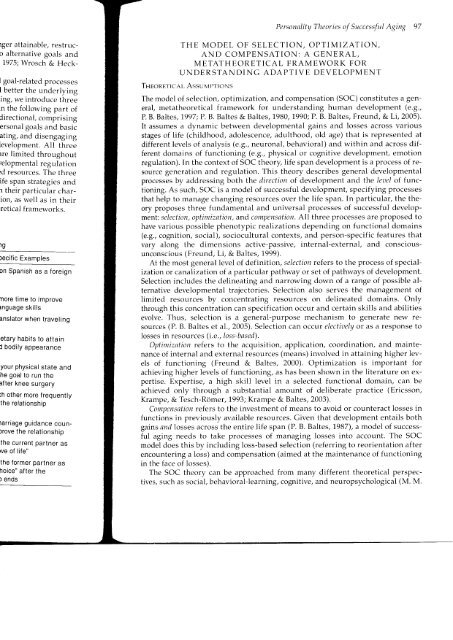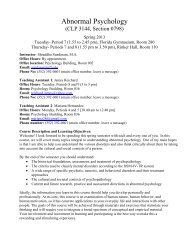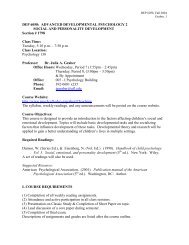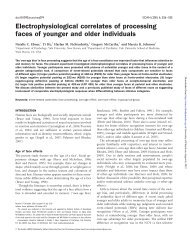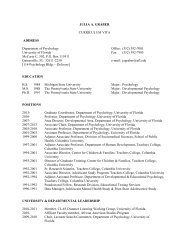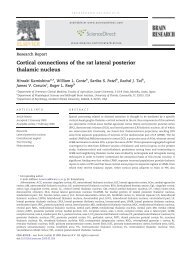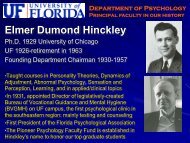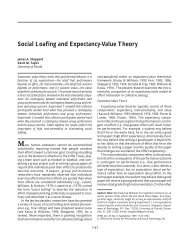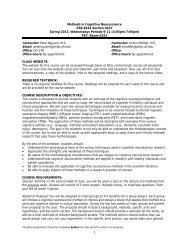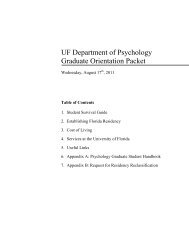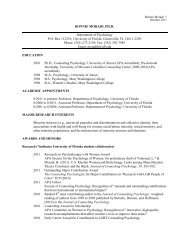Personality theories of successful aging - University of Florida ...
Personality theories of successful aging - University of Florida ...
Personality theories of successful aging - University of Florida ...
Create successful ePaper yourself
Turn your PDF publications into a flip-book with our unique Google optimized e-Paper software.
<strong>Personality</strong> Theories <strong>of</strong> Successful Aging 97<br />
rger attainable, restruc,<br />
o alternative goals and<br />
1975; Wrosch & Heck-<br />
I goal-related processes<br />
I better the underlying<br />
ing, we introduce three<br />
n the following part <strong>of</strong><br />
Cirectional, comprising<br />
ersonal goals and basic<br />
ating, and diseng<strong>aging</strong><br />
levelopment. All three<br />
rre limited throughout<br />
relopmental regulation<br />
ld resources. The three<br />
ife span strategies and<br />
r their particular charion,<br />
as well as in their<br />
retical frameworks.<br />
'lg<br />
lecific Examples<br />
on Spanish as a foreign<br />
Trore time to improve<br />
rnguage skills<br />
anslator when traveling<br />
etary habits to attain<br />
1 bodily appearance<br />
your physical state and<br />
he goal to run the<br />
rfter knee surgery<br />
;h other more f requently<br />
the relationship<br />
larriage guidance coun-<br />
)rove the relationship<br />
the current partner as<br />
rve <strong>of</strong> life"<br />
the former partner as<br />
hoice" af ter the<br />
) ends<br />
THE MODEL OF SELECTION, OPTIMIZATION,<br />
AND COMPENSATION: A GENERAL,<br />
METATHEORETICAL FRAMEWORK FOR<br />
UNDERSTANDING ADAPTIVE DEVELOPMENT<br />
TutonprrceL Assu M pt'toNS<br />
The model <strong>of</strong> selection, optimization, and compensation (SOC) constitutes a general,<br />
metatheoretical framework for understanding human development (e.9.,<br />
P. B. Baltes, 1997;P. B. Baltes & Baltes, 7980,7990; P. B. Baltes, Freund, & Li,2005).<br />
It assumes a dynamic between developmental gains and losses across various<br />
stages <strong>of</strong> life (childhood, adolescence, adulthood, old age) that is represented at<br />
different levels <strong>of</strong> analysis (e.g., neuronal, behavioral) and within and across different<br />
domains <strong>of</strong> functioning (e.g., physical or cognitive development, emotion<br />
regulation). In the context <strong>of</strong> SOC theory, life span development is a process <strong>of</strong> resource<br />
generation and regulation. This theory describes general developmental<br />
processes by addressing both the direction <strong>of</strong> development and the leael <strong>of</strong> functioning.<br />
As such, SOC is a model <strong>of</strong> <strong>successful</strong> development, specifying processes<br />
that help to manage changing resources over the life span. In particular, the theory<br />
proposes three fundamental and universal processes <strong>of</strong> <strong>successful</strong> development:<br />
selection, optirnization, and compensatiotr. All three processes are proposed to<br />
have various possible phenotypic realizations depending on functional domains<br />
(e.g., cognition, social), sociocultural contexts, and person-specific features that<br />
vary along the dimensions active-passive, internal-external, and consciousunconscious<br />
(Freund, Li, & Baltes,7999).<br />
At the most general level <strong>of</strong> definition, selection refers to the process <strong>of</strong> specialization<br />
or canalization <strong>of</strong> a particular pathway or set <strong>of</strong> pathways <strong>of</strong> development.<br />
Selection includes the delineating and narrowing down <strong>of</strong> a range <strong>of</strong> possible alternative<br />
developmental trajectories. Selection also serves the management <strong>of</strong><br />
limited resources by concentrating resources on delineated domains. Only<br />
through this concentration can specification occur and certain skills and abilities<br />
evolve. Thus, selection is a general-purpose mechanism to generate new resources<br />
(P. B. Baltes et al., 2005). Selection can occur electiaely or as a response to<br />
losses in resources (i.e., Ioss-based).<br />
Optinizatiot'L refers to the acquisition, application, coordination, and maintenance<br />
<strong>of</strong> internal and external resources (means) involved in attaining higher levels<br />
<strong>of</strong> functioning (Freund & Baltes, 2000). Optimization is important for<br />
achieving higher levels <strong>of</strong> functioning, as has been shown in the literature on expertise.<br />
Expertise, a high skill level in a selected functional domain, can be<br />
achieved only through a substantial amount <strong>of</strong> deliberate practice (Ericsson,<br />
Krampe, & Tesch-Romer,7993; Krampe & Baltes,2003).<br />
Compensntion refers to the investment <strong>of</strong> means to avoid or counteract losses in<br />
functions in previously available resources. Given that development entails both<br />
gains and losses across the entire life span (P. B. Baltes , 7987), a model <strong>of</strong> <strong>successful</strong><br />
<strong>aging</strong> needs to take processes <strong>of</strong> man<strong>aging</strong> losses into account. The SOC<br />
model does this by including loss-based selection (referring to reorientation after<br />
encountering a loss) and compensation (aimed at the maintenance <strong>of</strong> functioning<br />
in the face <strong>of</strong> losses).<br />
The SOC theory can be approached from many different theoretical perspectives,<br />
such as social, behavioral-learning, cognitive, and neuropsychological (M. M.


